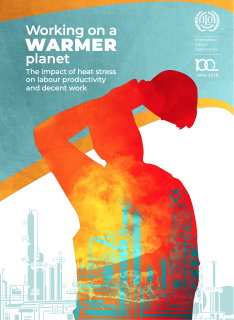
Global warming will make heat stress and extreme weather events more common. Climate projections point towards an increase in the frequency and intensity of extreme weather events, and one result of this trend is the loss of jobs and productivity. The rise in global temperatures caused by climate change will also make the phenomenon of “heat stress” more common. Heat stress refers to heat received in excess of that which the body can tolerate without suffering physiological impairment. Such excess heat increases workers’ occupational risks and vulnerability; it can lead to heatstroke and, ultimately, even to death.
The proliferation of so-called “urban heat islands”, areas of concentrated heat inside cities resulting from growing population numbers and urbanisation, will further intensify the impact of heatwaves, aggravating the risks faced by workers. The world of work’s response to global warming should include:
- Adaptation policies and actions to protect workers from these conditions;
- An overall strategy to mitigate climate change and limit further temperature increases;
- Structural reforms to help agricultural workers achieve the transition to other sectors; and
- Measures to prepare for climatic hazards.
This report looks at the impact of rising temperatures, and of the increasing frequency and intensity of heatwaves, on decent work and labour productivity. Drawing on climate and employment data, it presents estimates of the current and projected productivity losses resulting from heat stress at the national, regional, and global levels.
